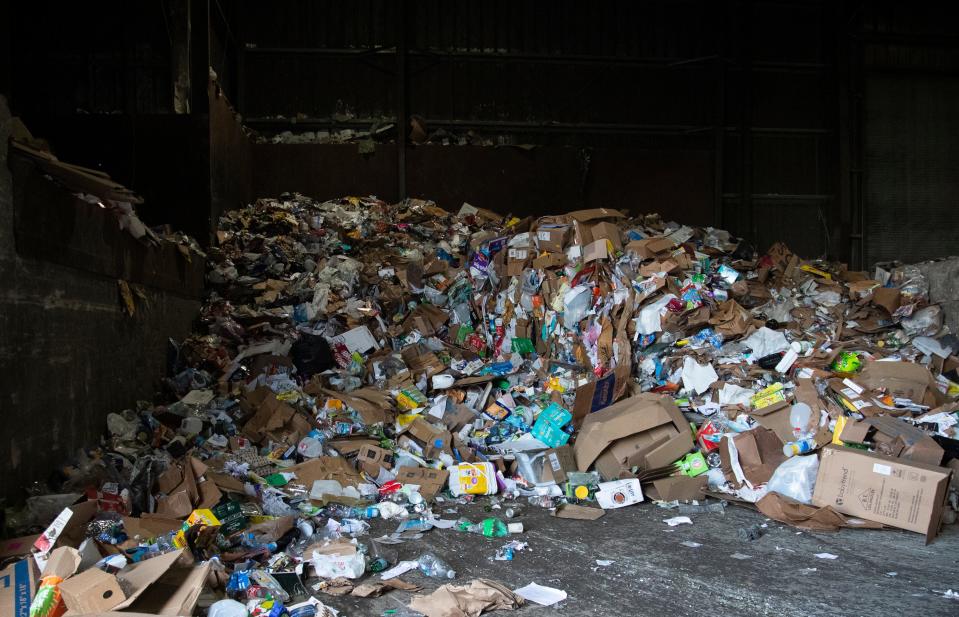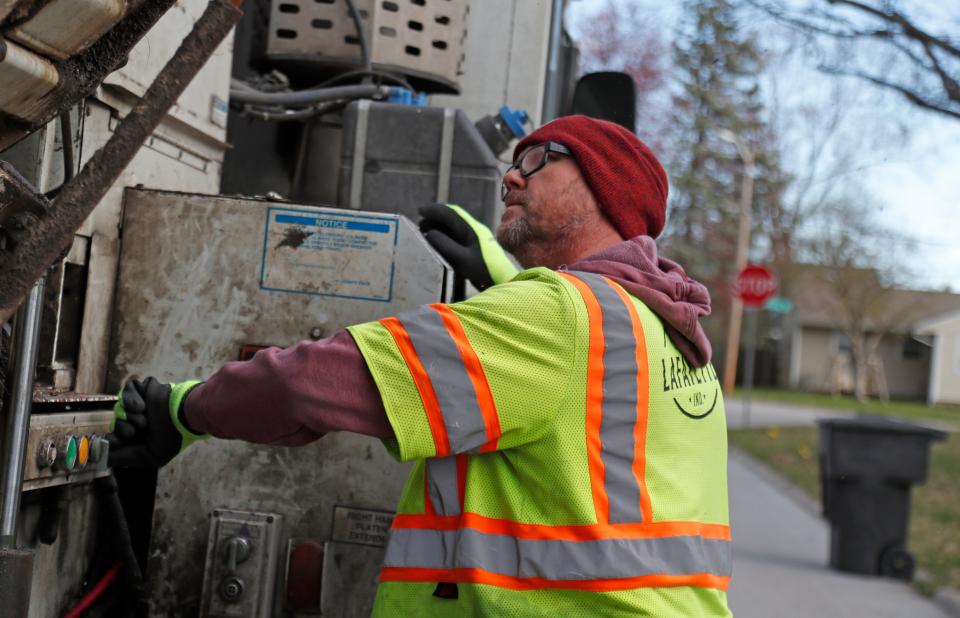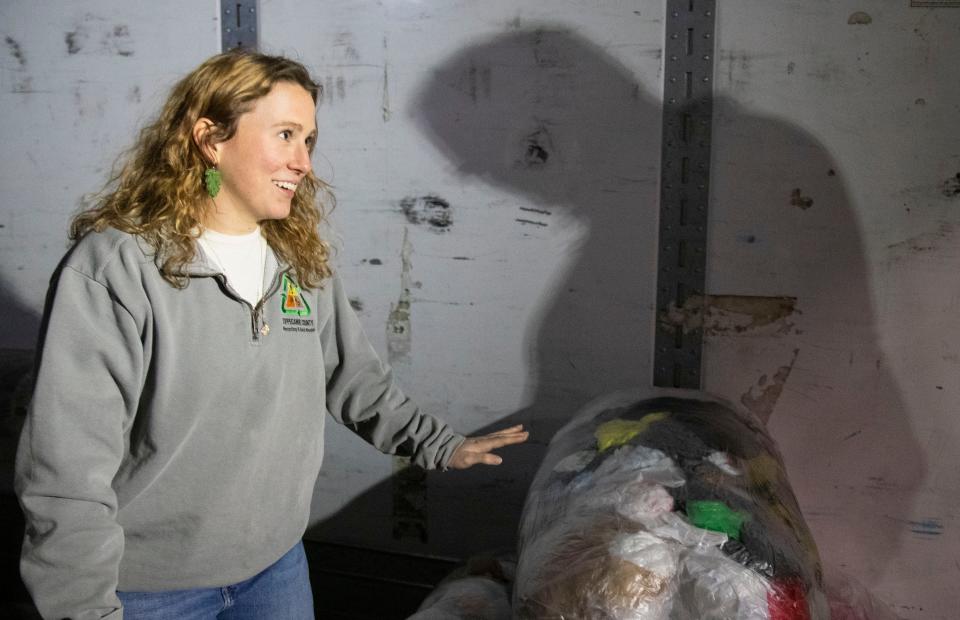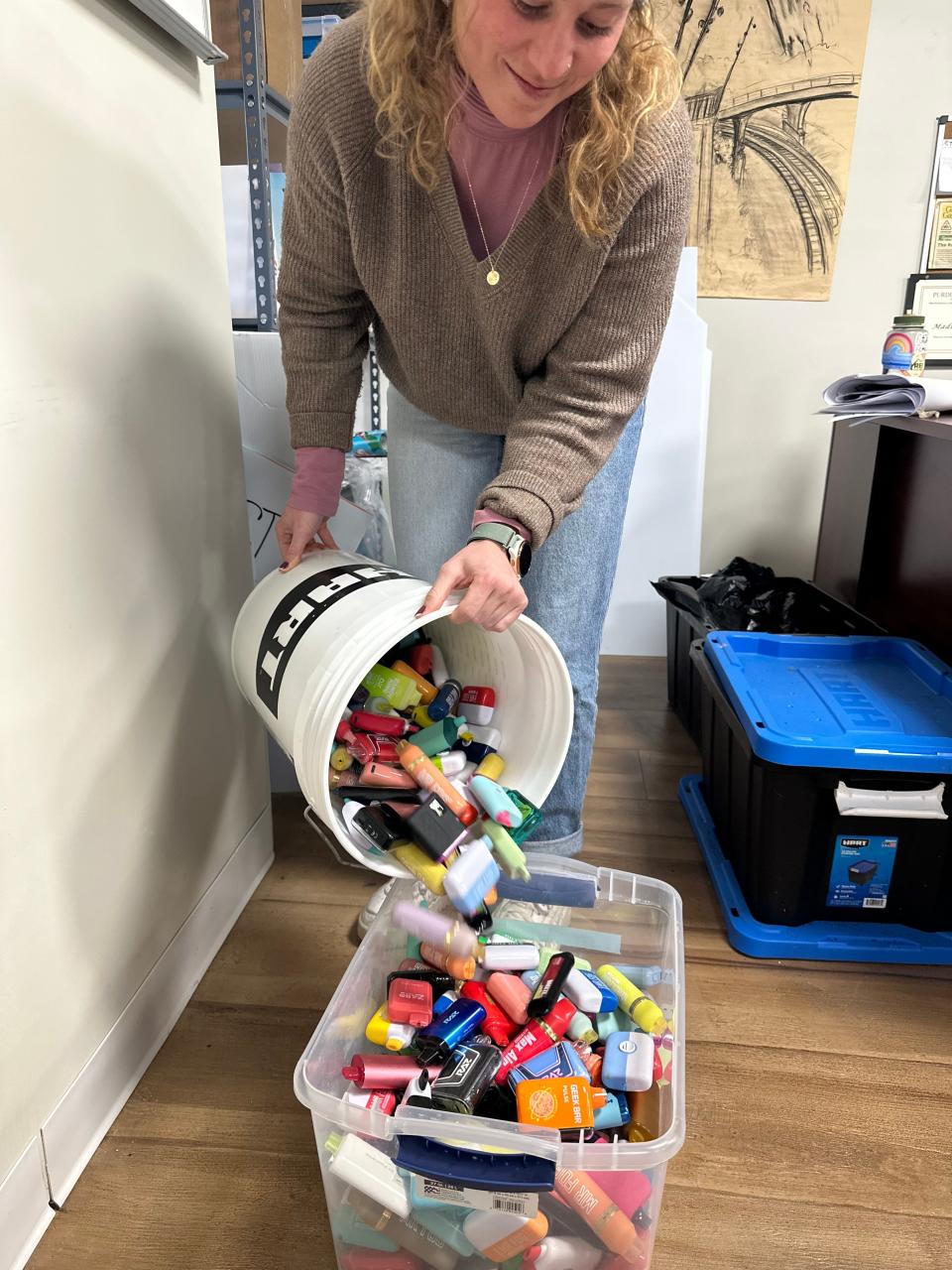Tippecanoe County works to become a more sustainable community, offering events and education
Editor's note: This is the second of a two-part series of recycling efforts in and around Tippecanoe County.
LAFAYETTE, Ind. — Madison Neher hadn’t really thought about her impact on the environment until 2018, when her hometown of Decatur introduced curbside recycling for city residents.
Coinciding with her senior year of high school, Neher, Tippecanoe County recycling and solid waste educator, said she can pinpoint that as the year when she became more sustainability-minded, taking environmental science courses, which led her to enroll at Purdue University as an aquatic sciences major.
But while it was easy for her to flip the mental switch in reducing waste and recycling when possible, Neher said it wasn’t something that came as easily to some of her family members.
“I can remember trying to get my parents to recycle during the first year I was in college, and it was like I was pulling their teeth out,” Neher laughed. “But now, they get so excited to recycle.”
Neher admits recycling can be confusing and frustrating for a lot of adults because the rules of what can and can’t be recycled continually change based what services are available. Being the voice behind the Tippecanoe Solid Waste Hotline, she hears of residents’ concerns daily.
But she loves those calls.

“I love being able to help them and put them in the right direction because I think it’s a really confusing system between private and public trash,” Neher said. “People want to be able to recycle everything, but I think we, as a society, need to think more about our consumption.
"‘Reduce’ is the first step in all of this," she said. "Like, yeah, you could go out and buy all of these cheap plastic totes, but they’re not recyclable, so what happens when they’re broken and you don’t want them anymore?”
This isn’t just a problem, Neher encounters each day, either.
'It's gotten worse'
On a trash route on the south side of Lafayette, sanitation workers Wayne Coddington and Scott Robinson work quickly among a cul-de-sac street to line up trash and recycling bins to their prospective lifts on the side of their truck. Coddington grabs hold of the handle to a resident’s recycling bin, giving it a shake before lining it up to the truck’s prongs.
After eight years working as a sanitation worker, Coddington said he no longer has to look into a recycling bin to know if it holds what it should, recyclable materials — he can feel it.
“You can feel the difference easily, but I still look inside,” Coddington said.
Recyclable goods don’t weigh nearly as much as regular garbage, Robinson explained, so when a recycling bin is particularly heavy, sanitation workers can tell a resident has mixed their trash into their recycling.
“If it’s heavy, and you look inside and you see just cans or whatever, it’s going in the trash,” Robinson said. “We can always tell. People will fill up their recycling toters first and then move over to the trash toter and fill that up, too.”

Robinson said it’s frustrating for sanitation workers, as it puts more pressure on them to make the right call as to whether the bin’s contents should be dumped into the trash side of the truck or the recycling. If the truck’s recycling load contains any garbage, the entire load must be thrown in with the garbage.
Something Coddington has noticed, having worked in sanitation prior to the COVID-19 pandemic through to now, is that Lafayette’s residential trash has dramatically increased, as more people are working from home.
“Before COVID, people went into work, so their trash was thrown away there, and now it seems like everybody’s got more trash,” Coddington said. “They run out of room in their garbage toter, so they think they can just throw it into the recycle toter. It’s got to go somewhere.”
Robinson, who has worked in sanitation for the past 10 years, said when he first began in this job, workers were given a sheet with a front-to-back list of what could be recycled. But now, that list has shrunk down to a paragraph explanation of items.
When the city used smaller blue bins for recycling, Robinson said that was large enough for most residents, but as the list for recyclables grew, residents found themselves in need of multiple blue bins, ultimately leading to the larger recycle toters Lafayette city residents have today.
Standing along the curb, Coddington points out a home with a blue recycling bin beside a trash toter. Having worked this route for a while, Coddington said he’s gotten familiar with a lot of the residents and their trash habits.
“That guy has his blue bin out every week, and it’s always full,” Coddington said. “He’s a much older guy — he’s retired, and he just does it right.”
That’s a pattern Coddington and Robinson both say they see among residents — older generations, who have lived in the city for much of their life and who have a solid understanding for what is generally recyclable, despite ebbs and flows of what has generally been acceptable for recycling after several decades.
How do you make people care?
Monica Christopher, an educator for Tippecanoe County Partnership for Water Quality, said the fun part about her job is, well, finding ways to make recycling fun.
When Christopher makes educational visits to area schools, she’ll bring along a large recycling bin of plastic waste and dump it across the classroom floor. The hands-on experience allows students to visualize what is, and what isn’t, recyclable.
One of the items Christopher teaches students isn’t recyclable in their home’s mixed recycling is plastic bags. But while families can’t toss those shopping bags in with their plastic bottles and aluminum cans, Christopher introduces students to the plastic bag recycling program offered by the county.
For every 1,000 pounds of plastic bags, which Christopher explains constitutes any type of bag that is flexible enough to punch a hole through with your finger, the county is able to have a six-foot long bench created, offering a recyclable option for the common pollution item. While collection bins for bags can be found on each floor of the Tippecanoe County Building, Christopher said her biggest contributors are area elementary schools.
“Edgelea Elementary is one of my schools that is really good about collecting bags. They have a competition among classes to see who can collect the most plastic,” Christopher said. “It’s one of those real teachable moments. The students go home and tell their parents about what can and can’t be recycled. I always tell them, ‘reduce, reuse, recycle and rethink,” because we have to rethink about what we’re doing. There is no real 'away.'”
If Christopher could place more plastic collection bins anywhere, it would be in more schools, she said. The excitement students bring home during the collection competitions trickles downward into less waste going into landfills, so overall it’s a worthy cause.
“Some of the students’ parents work in factories here in town, and we’ve actually had students bring in the industrial plastic wrap that would have otherwise been thrown out at the factories,” Christopher said. “As the sole person who goes around collecting the bags, I don’t even care — I’m just happy it got recycled and didn’t get thrown away.”

Moving into year four of the plastic bag recycling program, as Christopher works on collecting bags to create bench No. 6, she can’t begin to picture how much plastic has been saved from local landfills and water ways. In Christopher’s eyes, getting to the next level of recycling efforts will largely start with children.
“What I try to tell kids is, ‘Who’s responsible for this? We are. We’re responsible for our bodies of water and keeping them clean. No one is going to do it for us,’” Christopher said. “If you like to play in water, and you like to have recreation and go fishing, then our bodies of water have to be clean.”
Tom Murtaugh, Tippecanoe County commissioner, said getting conversations around recycling off the ground, like what Christopher sparks in area schools, will be key to turning a corner on the county’s overall recycling efforts. Having a local business like Fiber Global, which recycles corrugated cardboard collected in both Lafayette and at Tippecanoe County's Trash Transfer Station, makes starting those conversations a bit easier.
“I think with this kind of publicity, and the success of a local business who’s doing it firsthand, might push us into that next level in encouraging households to recycle,” Murtaugh said.
Pursuing more recycling opportunities
A piece of the puzzle for increasing awareness around recycling, Murtaugh said, is adding events for county residents to properly dispose of problematic items. One of the more popular events, held twice each year, is the Tippecanoe County E-Waste Day.
As the spring E-Waste Day approaches on April 6 at the Tippecanoe County Fairgrounds from 8 a.m. to 2 p.m., Murtaugh said it is expected to be another successful event, adding to the hundreds of tons of e-waste the county has collected in recent years.
In the hopes of piggybacking off the success of e-waste take back, Neher and Christopher are currently planning a tire take-back event for the summer, as improper tire disposal has been a problem in the county for years, the educators explained.
Throughout the year, county and environmental workers will cruise the Wabash River to pull out tires, with some so deeply embedded after years of settling, Christopher said it can prove to be a significant task to remove them.
But a new problem infiltrating landfills, Neher said, is disposable vapes — that is, if they ever reach the landfill.

“Vapes are a big issue right now because they have lithium-ion batteries in them, which is what’s in our phones and rechargeable batteries, but we don’t throw those away,” Neher explained. “We take those devices to a place to be recycled, at least you should theoretically, but we also aren’t going through a smart phone every few days like people are vapes.”
The problem with disposable vapes isn’t just that they are bad for the environment – it’s that they’re a fire hazard.
Ben Anderson, director of West Lafayette Public Works, said when the disposable vapes are tossed in with the rest of someone’s garbage into the city’s trash trucks, the compaction blades catch onto the vapes, causing the battery packs to break open. The batteries are then smeared across the truck’s inner walls, and the friction caused by other garbage causes fires.
“We’ve had several instances where things have begun to smolder from a vape breaking and we have to extinguish it,” Anderson explained. “Our department hasn’t had a truck catch fire yet, but a private company that operates in town told me they have, and they had to dump their load in the middle of the street to put it out.”
The concern for lithium-ion fires on trucks has grown so much so, that Anderson said when talking with Neher, he proposed she find a solution.
Through Green Wave Computer Recycling, an Indianapolis-based company who also assists Tippecanoe County with its E-Waste Recycling days, Neher said she was able to organize a free disposable vape take back program that is year-round. Partnering with area vape shops, Neher said she offers to leave the stores a container for customers to properly dispose of their discarded devices, with Indy Smoke Time and AM/PM being her two biggest recycling spots.
In Neher’s office, buckets of disposable vapes sit, awaiting to be toted away to Indianapolis. Working to condense the week’s haul of e-devices into one container, Neher pours one bucket’s contents into a large tote, with the smell of artificial fruit flavoring wafting among the brightly colored cartridges.
But this is one of the things Neher said she loves most about her job — finding new ways and opportunities, no matter how dirty they may be, for area residents to help prevent waste while breaking down false ideas around recycling.
“The biggest misconception in this county is that our recycling doesn’t actually get recycled,” Neher said. “I get people on the phone all of the time, and they’ll call to just ask if their recycling is actually getting recycled. When I first started this job, dealing with the calls was hard, but now it’s a really exciting time because we are on the up and up, I think, with recycling. The hope with everything we do is that we can all get to a better level of sustainability.”
Jillian Ellison is a reporter for the Journal & Courier. She can be reached by email at jellison@gannett.com. Follow her on X at @ellison_writes.
This article originally appeared on Lafayette Journal & Courier: How does Tippecanoe County recycle some of its most toxic materials?

